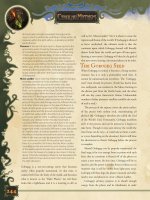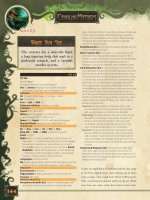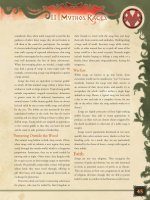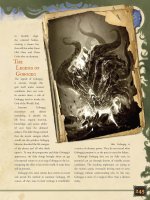Sandy petersens cthulhu mythos (1) 249
Bạn đang xem bản rút gọn của tài liệu. Xem và tải ngay bản đầy đủ của tài liệu tại đây (414.12 KB, 1 trang )
Sandy’s Notes
USING GHATANOTHOA
Images of this horrendous deity retain its terrible
power when properly enchanted. They are
typically made of greenish or brownish soapstone,
and when infused with Ghatanothoa’s awful
essence, the “eyes” become silvery and glistening.
Even a hologram or illusion of Ghatanothoa
has the same paralyzing effect as the real thing
as long as it is a perfect likeness as defined in the
influence. Player characters have to destroy or
obscure the statue, or stop the device or individual
projecting the illusion, to save themselves from
the mummification. Disbelieving an illusion of
Ghatanothoa doesn’t help, because it is simply
the image’s appearance creating the effect—it
doesn’t have to be “real.”
Of course, a spellcaster able to project a perfect
illusion of Ghatanothoa needs to have seen
Ghatanothoa, which means the caster might
also be a stiff, immobile mummy. But that can
be a devious defensive ploy for an awakened
demilich: it mummifies itself (costing it little
relative to what it has already lost), then creates
the Ghatanothoa illusion to guard its skull. Even
while paralyzed, it can use spells and spell-like
abilities to move around and take actions. The
Lich Arkantos carved a stone golem into the
likeness of Ghatanothoa. He then had a mobile
creature which could move, and attack, and
mummify its opponents.
would appear, most of the people of Mu hid inside their
houses (none of which had windows facing the crater).
That way, only the hapless folks caught outside would
be subject to mummification. Ghatanothoa’s icons and
statues in their temples are always shielded by a wall or
curtain to protect the priests.
Ghatanothoa’s magic works on the mind as well as
the body. Completely mindless creatures are actually
immune to Ghatanothoa’s mummification, though
creatures normally immune to ability damage and
drain (such as intelligent undead) notably are not.
Somewhat ironically, even an undead mummy can be
further “mummified” by Ghatanothoa.
The paralysis caused by Ghatanothoa is not
instantaneous. When the sequence begins, victims
stiffen. If the image is then quickly hidden or the
victim can somehow get “out of sight,” the effect
stops, but otherwise the victim’s fate is a terrible
form of suspended animation. Soon, the unfortunate
transforms into a withered, leathery mummy, totally
incapable of movement. However, its brain stays alive
and functioning, and is in fact magically preserved.
Ghatanothoa's mummification relies on line of sight,
242
Mummified
victims
cannot
die
except
by
not on actual perception. A victim's back can be turned,
destruction of their brains. Their minds remain active,
or eyes can be shut, yet the effect still occurs. The god’s
aware of their circumstances, and always conscious.
true image simply has to be revealed to the victim,
Most go mad after a few days, months, or years, and
without anything blocking it. The effect is not visual
even if the curse is somehow ended, the madness
and can happen even in a dark room. Ghatanothoa
remains. In the awful aftermath of the occasional
and its images generate a unique energy that moves
Ghatanothoa emergence, the local priests often cut
along the same paths as light (though it is invisible).
open the skulls of its victims to kill the still-living
This energy can be blocked by anything opaque, even
brains, as it’s the only way to spare them an eternity of
a thin cloth. In ancient times, when Ghatanothoa
paralyzed horror.









